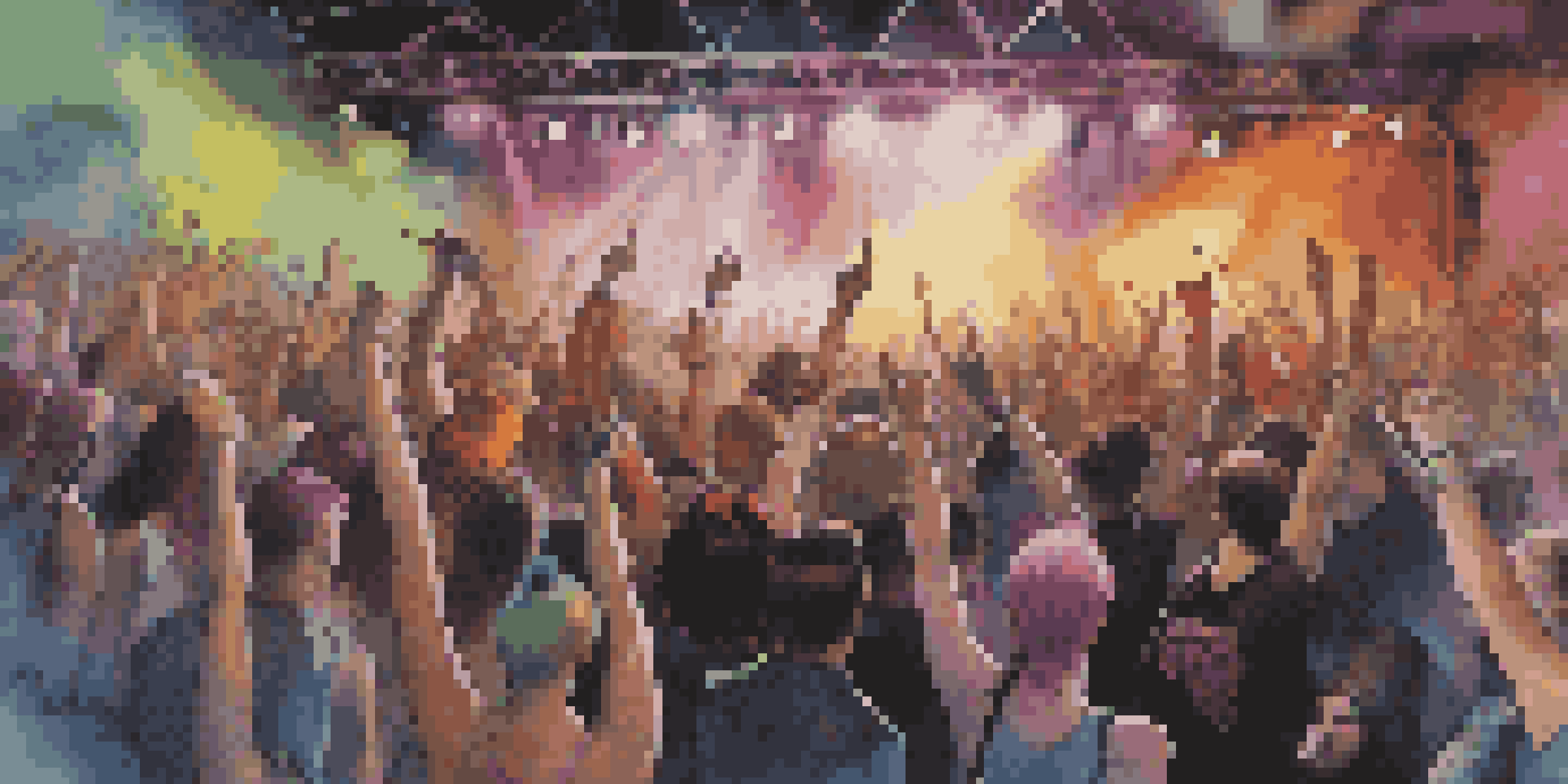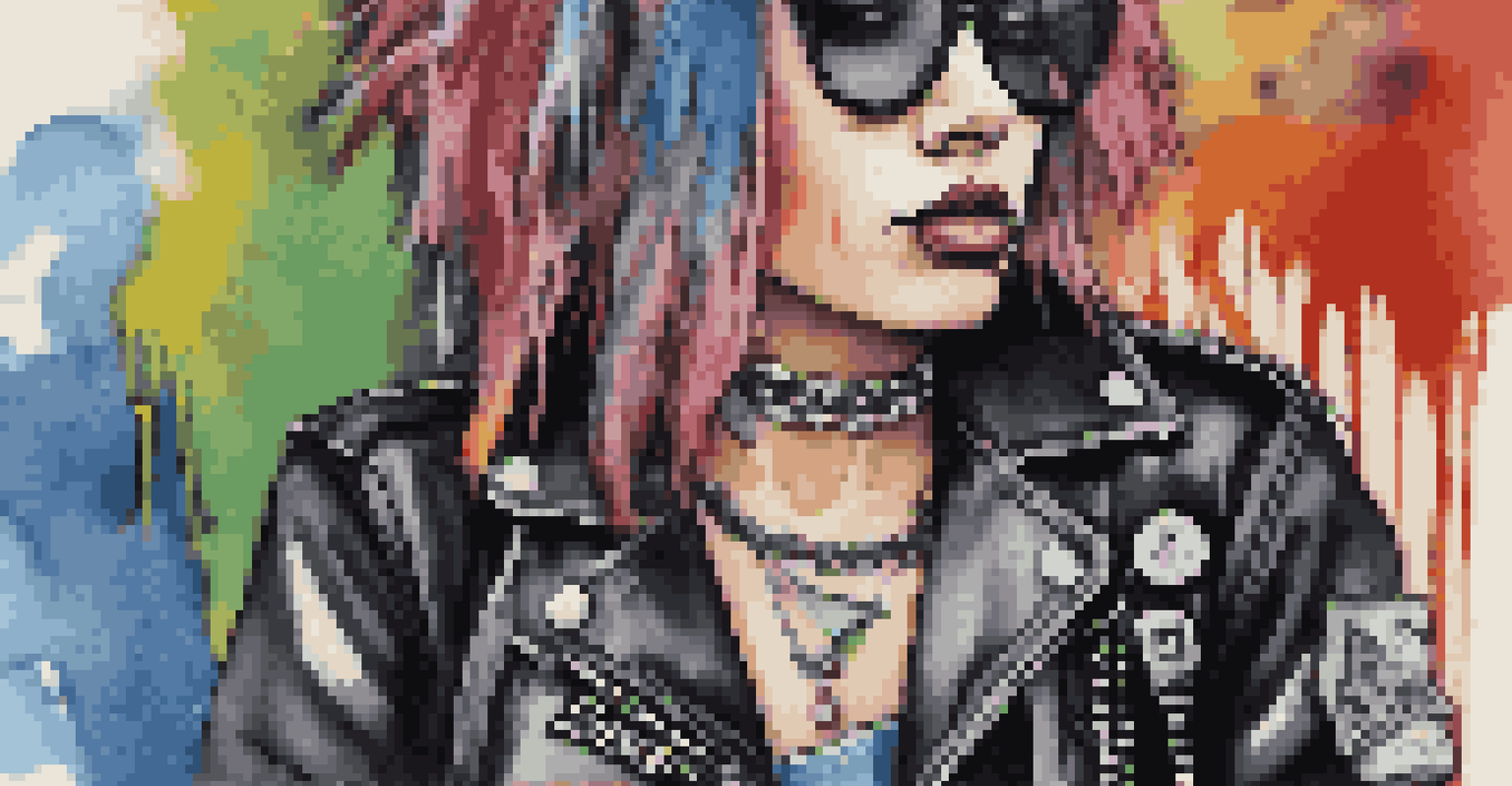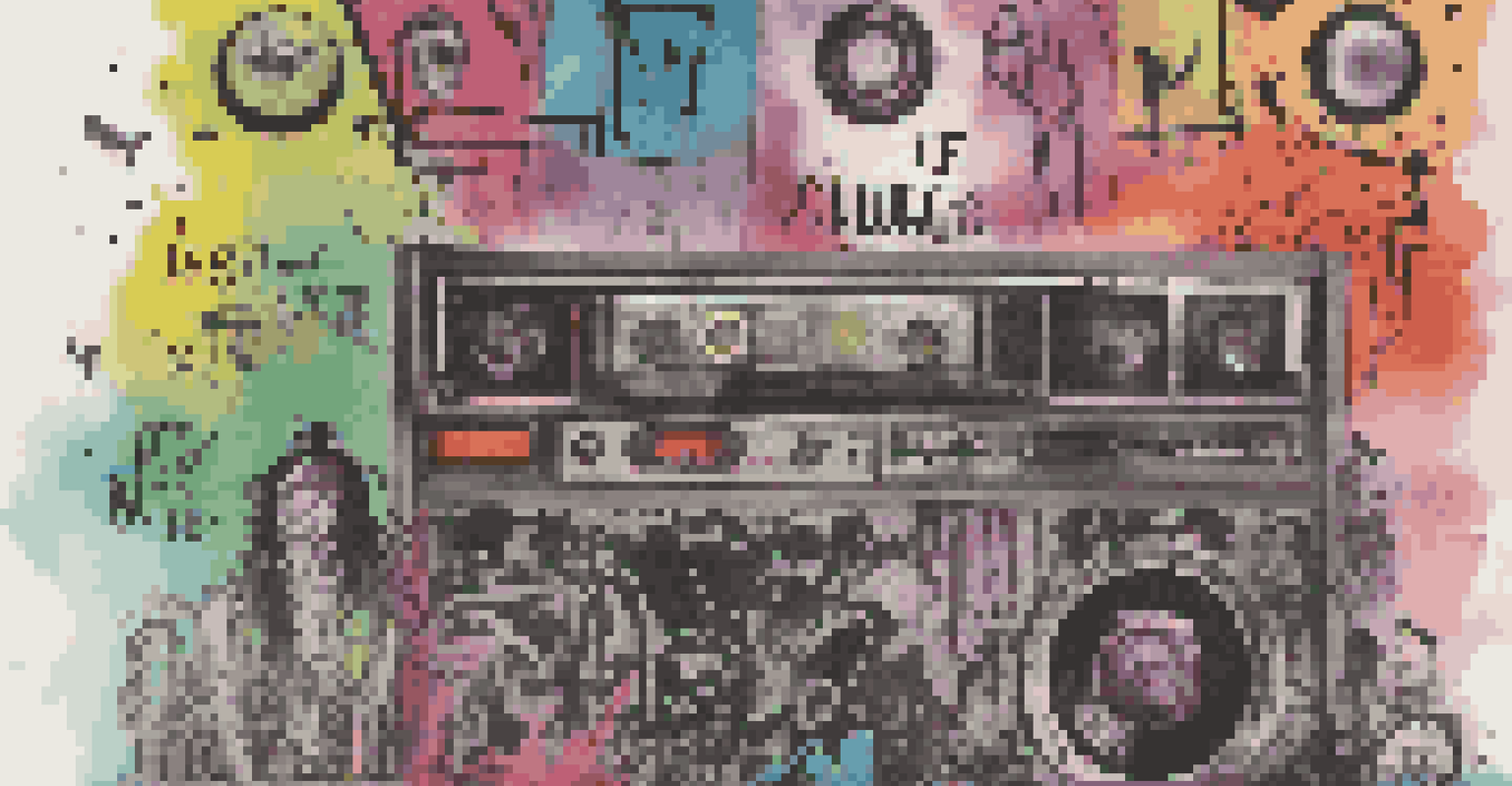The Influence of Punk Rock on Global Music Cultures

The Birth of Punk Rock: A Cultural Revolution
Punk rock emerged in the mid-1970s as a rebellious response to mainstream music. With its raw sound and anti-establishment lyrics, it resonated deeply with disenchanted youth. Bands like the Ramones and Sex Pistols became symbols of this movement, challenging societal norms and the music industry itself.
Punk is musical freedom. It's saying, doing and playing what you want.
This genre was not just about music; it was a cultural phenomenon that embraced DIY ethics and individualism. Punk rock encouraged fans to express themselves authentically, leading to the formation of local scenes around the globe. The simplicity of punk music made it accessible, allowing anyone to pick up an instrument and join the movement.
As punk rock spread, it sparked conversations about politics, identity, and social issues. Its influence can still be seen in various genres today, proving that punk rock was more than just a fleeting trend; it was a cultural revolution that left an indelible mark on music history.
Punk Rock's Global Reach: From London to Tokyo
While punk rock originated in the United States and the United Kingdom, its influence quickly spread to countries like Japan, Brazil, and beyond. In Japan, bands like The Stalin and Shonen Knife took the punk ethos and infused it with their unique cultural elements, creating a distinct sound. This adaptation showcased how punk could transcend borders and resonate with different audiences.

In Brazil, the punk movement emerged as a response to political oppression during military rule. Brazilian punk bands like Ratos de Porão used music as a tool for social commentary, addressing issues like inequality and censorship. This highlighted how punk rock could adapt to local struggles while maintaining its core values of rebellion and authenticity.
Punk Rock: A Cultural Revolution
Emerging as a response to mainstream music, punk rock became a powerful cultural movement that challenged societal norms and inspired authentic self-expression.
As punk rock blended with various local cultures, it evolved into subgenres that reflected regional identities. Whether it's the ska-infused punk of the UK or the hardcore sounds from the US, each adaptation tells a story of resilience and creativity, demonstrating the universal appeal of punk rock.
The DIY Ethos: Empowering Independent Artists
One of the most significant aspects of punk rock is its DIY (do-it-yourself) ethos, which encouraged artists to take control of their music careers. This philosophy empowered musicians to produce, promote, and distribute their work without relying on major record labels. As a result, many underground scenes flourished, fostering creativity and innovation.
The beauty of punk is that it’s a way of life, not just a genre of music.
By rejecting traditional industry norms, punk artists inspired countless others to follow suit. Independent record labels, zines, and grassroots venues became the backbone of the punk community, creating a supportive network for emerging talent. This DIY spirit continues to thrive today, influencing genres like indie rock and hip-hop.
The accessibility of punk rock has led to a diverse array of voices in music, as artists from various backgrounds can share their stories. This democratization of music creation has not only enriched the punk genre but has also paved the way for future generations of musicians to express themselves authentically.
Punk Rock and Political Activism: A Voice for Change
Punk rock has always been intertwined with political activism, using its platform to address social injustices and advocate for change. Bands like Dead Kennedys and Anti-Flag tackled issues such as war, racism, and environmentalism through their lyrics. This commitment to activism transformed punk into a powerful voice for marginalized communities.
Many punk musicians have used their influence to raise awareness about critical issues, participating in protests and charity events. The genre's ability to inspire action and galvanize support for various causes is a testament to its impact beyond just music. Punk rock fosters a sense of solidarity among fans, encouraging them to engage with social issues.
DIY Ethos Empowers Artists
The do-it-yourself philosophy of punk rock enabled musicians to take control of their careers, fostering independent creativity and a supportive community.
This activist spirit has also led to the emergence of various punk-inspired movements, such as Riot Grrrl, which focused on feminism and gender equality. By advocating for these causes, punk rock continues to shape conversations around social justice and inspire new generations of activists.
Punk Rock's Influence on Modern Music Genres
Punk rock's legacy can be seen in numerous modern music genres, including pop-punk, emo, and post-hardcore. Bands like Green Day and Blink-182 brought punk sensibilities to mainstream audiences, blending catchy melodies with rebellious themes. This fusion helped to introduce punk's ethos to a new generation of listeners.
Moreover, punk rock has influenced genres beyond its immediate sphere, impacting hip-hop, metal, and electronic music. The raw energy and attitude of punk can be found in the works of artists like Kid Rock and even electronic acts that embrace punk aesthetics. This cross-pollination highlights punk's versatility and enduring relevance.
As artists continue to draw from punk's rich history, the genre's influence remains a vibrant part of music culture. The spirit of punk lives on in countless songs, reminding us of the power of rebellion and the importance of staying true to oneself.
Fashion and Aesthetics: Punk's Iconic Visual Identity
Punk rock isn't just about the sound; it's also known for its distinctive fashion and visual aesthetics. The punk look, characterized by leather jackets, ripped jeans, and bold hairstyles, became a form of self-expression for fans. This iconic style challenged conventional norms and allowed individuals to showcase their identities unapologetically.
The punk fashion movement paved the way for various subcultures, influencing designers and mainstream fashion alike. Brands like Vivienne Westwood played a significant role in bringing punk aesthetics to high fashion, demonstrating how music and style can intersect. This fusion continues to inspire designers today, as they draw on punk's rebellious spirit.
Punk's Lasting Political Impact
Punk rock has consistently served as a voice for change, addressing social injustices and inspiring activism through its music and community engagement.
Additionally, punk rock's visual identity extends beyond clothing to include artwork, album covers, and concert posters. The DIY approach to design reflects the genre's ethos, with fans creating their own merchandise and promotional materials. This creativity reinforces the idea that punk is not just a genre of music but a comprehensive cultural movement.
The Future of Punk Rock: Evolving and Adapting
As we look to the future, punk rock continues to evolve while staying true to its roots. New artists and bands are emerging, blending punk influences with contemporary sounds to create fresh interpretations of the genre. This adaptability ensures that punk remains relevant in an ever-changing musical landscape.
The rise of digital platforms has also transformed how punk music is created and consumed. Musicians can now share their work instantly with global audiences, fostering collaboration and innovation. This accessibility has allowed punk to thrive in new forms, ensuring its legacy endures.

While the sound may change, the core values of punk rock—individuality, rebellion, and authenticity—will always resonate. As long as there are voices seeking to challenge the status quo, punk rock will continue to inspire and influence music cultures around the world.